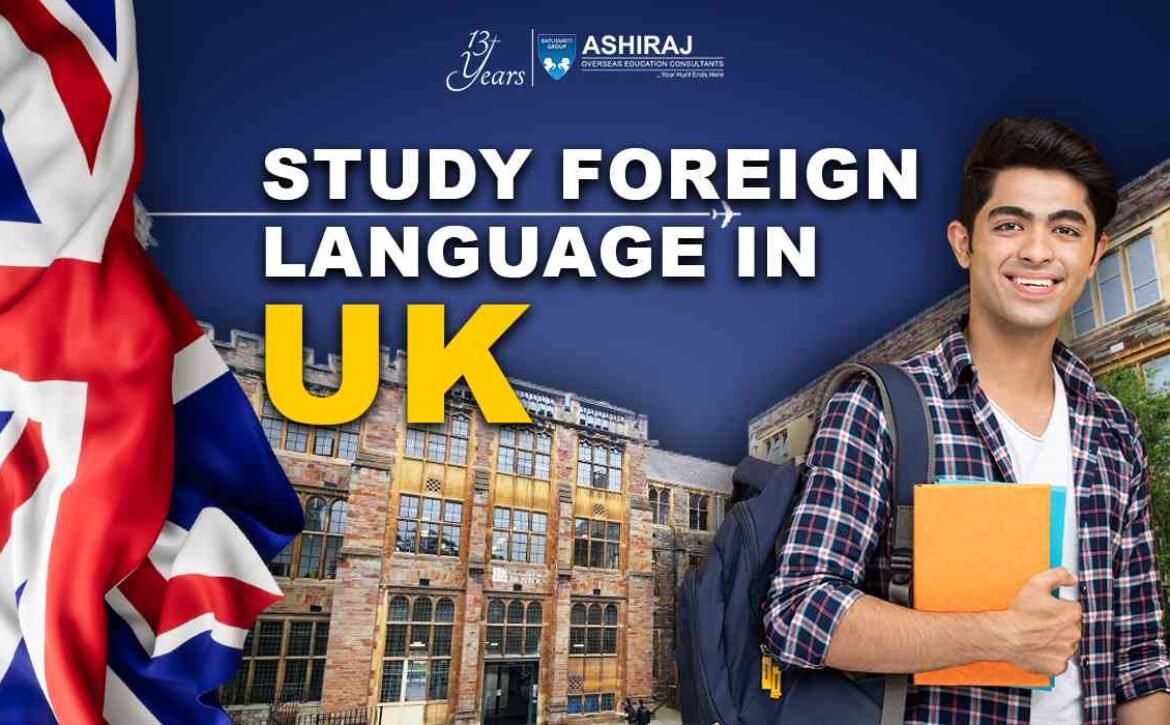
Foreign Language in UK
The study and acquisition of foreign languages hold significant importance in the United Kingdom’s cultural, economic, and social fabric. In recent years, the emphasis on learning foreign languages has grown as the world becomes increasingly interconnected. Foreign Language in UK classrooms has emerged as a focal point, reflecting the nation’s recognition of the benefits of multilingualism in a globalized society. As the UK engages in diverse international exchanges, proficiency in foreign languages becomes not just advantageous but imperative for fostering effective communication and understanding across borders.
Furthermore, with the rise of globalization and the interconnectedness of economies, proficiency in Foreign Languages in UK settings enhances individuals’ employability and opens doors to international career opportunities. The UK’s commitment to promoting language learning underscores its recognition of linguistic diversity as a cornerstone of global citizenship. In classrooms, workplaces, and communities across the UK, the pursuit of foreign language proficiency reflects a broader commitment to embracing diverse cultures and fostering meaningful cross-cultural dialogue and exchange.
Why Study Foreign Language in the UK?
- Global Opportunities: Learning a foreign language in the UK opens doors to global opportunities, both professionally and personally. With the UK’s multicultural environment, mastering a foreign language enhances your ability to connect with people from diverse backgrounds.
- Enhanced Employability: In an increasingly competitive job market, proficiency in a foreign language sets you apart from other candidates. Employers value language skills as they seek individuals who can communicate effectively in international settings.
- Cultural Enrichment: Studying a foreign language in the UK provides a gateway to exploring different cultures and traditions. It fosters a deeper understanding and appreciation of global perspectives, enriching your personal growth and worldview.
- Academic Advantages: Many universities in the UK offer foreign language programs that complement various fields of study. Learning a foreign language enhances academic performance and expands research opportunities by providing access to diverse sources and perspectives.
- Travel and Exploration: Proficiency in a foreign language enhances your travel experiences by enabling meaningful interactions with local communities. Whether for leisure or business, speaking the local language opens doors to immersive and authentic experiences abroad.
In conclusion, studying a foreign language in the UK is not just about language acquisition; it’s about embracing diversity, expanding horizons, and preparing for a globally connected future. Foreign Language in UK programs offer invaluable opportunities for personal, academic, and professional growth.
Top Universities to Study Foreign Language in UK
University | QS World University Ranking 2023 | Type of University | Average Annual Fees | Programs Offered |
University of Cambridge | 1 | Public | £9,250 – £10,000 | Modern Languages, Linguistics |
University of Oxford | 2 | Public | £9,250 – £10,000 | Modern Languages, Linguistics |
University College London | 8 | Public | £9,250 – £10,000 | Modern Languages, Translation |
University of Edinburgh | 20 | Public | £9,250 – £10,000 | Languages, Literature |
University of Manchester | 27 | Public | £9,250 – £10,000 | Languages, Translation |
Studying foreign languages in the UK offers a wealth of opportunities, especially with access to some of the world’s top universities. Here’s a list of top universities in the UK for Foreign Language in UK programs:
- University of Cambridge: Renowned for its academic excellence, Cambridge offers programs in Modern Languages and Linguistics, providing students with a comprehensive understanding of various languages and their cultural contexts.
- University of Oxford: Another prestigious institution, Oxford, offers programs in Modern Languages and Linguistics, equipping students with linguistic proficiency and critical thinking skills essential for global communication.
- University College London (UCL): UCL ranks high in the QS World University Rankings and offers programs in Modern Languages and Translation, emphasizing practical language skills and cultural understanding.
- University of Edinburgh: With a strong emphasis on languages and literature, Edinburgh provides students with immersive language learning experiences and opportunities for cross-cultural exchange.
- University of Manchester: Manchester offers programs in Languages and Translation, preparing students for diverse career paths in international relations, business, and academia. With affordable tuition fees and world-class faculty, these universities provide an excellent platform for students pursuing Foreign Language in UK studies.
Course Curriculum for Foreign Language in UK
- Language Proficiency: The curriculum focuses on developing proficiency in reading, writing, speaking, and listening skills in the target language, ensuring students attain fluency and accuracy.
- Cultural Studies: Students explore the cultural nuances and traditions associated with the target language, gaining insights into the social, historical, and literary aspects of the language’s native speakers.
- Linguistics: The curriculum includes courses in linguistics, offering students a deeper understanding of language structure, syntax, semantics, and phonetics, enhancing their analytical and critical thinking abilities.
- Translation and Interpretation: Students learn translation and interpretation techniques, honing their ability to convey meaning accurately between languages and cultures, preparing them for careers in translation, interpretation, and localization.
- Literature and Media: The curriculum often includes the study of literature, film, and media in the target language, allowing students to explore diverse literary genres, cinematic traditions, and contemporary media trends.
Foreign Language in UK programs offer a comprehensive curriculum designed to equip students with linguistic proficiency, cultural competence, and intercultural communication skills essential for navigating a globalized world. Through a combination of language instruction, cultural studies, and practical training, students emerge with a deep appreciation for linguistic diversity and the ability to engage meaningfully with diverse communities and contexts.
Eligibility Criteria & Admission Requirements for MS in Foreign Language in UK
- Language Proficiency Test: Applicants are typically required to provide proof of proficiency in English through standardized tests such as IELTS (International English Language Testing System) or TOEFL (Test of English as a Foreign Language). Minimum scores for IELTS are 6.5 to 7.0, and for TOEFL, they range from 80 to 100.
- Graduate Admission Test: Some programs may require applicants to submit scores from standardized graduate admission tests such as GRE (Graduate Record Examination) or GMAT (Graduate Management Admission Test). Minimum scores for GRE are around 155-160 for verbal and 155-165 for quantitative, while GMAT scores vary but generally fall between 600 to 700.
Eligibility Criteria | Minimum Marks/Score |
IELTS | 6.5 – 7.0 |
TOEFL | 80 – 100 |
GRE (Verbal) | 155 – 160 |
GRE (Quantitative) | 155 – 165 |
GMAT | 600 – 700 |
- Passport & Student Visa: International students must possess a valid passport and obtain a student visa to study in the UK. The visa application process typically requires proof of admission to a recognized educational institution and sufficient financial support.
- Academic Certificates: Applicants must submit academic transcripts and certificates demonstrating completion of previous education levels, including secondary school and any higher education degrees.
- Work Experience (if applicable): Some programs may require or prefer applicants to have relevant work experience in language-related fields, such as translation, interpretation, or language teaching.
Foreign Language in UK programs maintain rigorous eligibility criteria to ensure that students possess the necessary language skills and academic qualifications to succeed in their studies and contribute meaningfully to the academic community.
Documents Required for Studying Foreign Language in UK
- Passport: A valid passport is essential for international students applying to Foreign Language in UK programs. It serves as proof of identity and nationality throughout the application process and during the duration of study in the UK.
- Letters of Recommendation (LOR): Applicants typically need to provide two letters of recommendation from academic or professional references. These letters should attest to the applicant’s academic abilities, character, and suitability for the chosen program.
- Statement of Purpose (SOP): The SOP is a crucial document that outlines the applicant’s academic and professional goals, reasons for choosing the specific program, and how the program aligns with their career aspirations.
- Curriculum Vitae (CV): A comprehensive CV highlighting academic achievements, work experience, extracurricular activities, and any relevant skills or certifications is required.
- Official High School Transcripts and Educational Certificates: Applicants must submit official transcripts and certificates from their high school or previous educational institutions, demonstrating academic qualifications and achievements.
- Work Experience Certificate: If applicable, applicants should provide a certificate or letter verifying any relevant work experience in language-related fields or other relevant industries.
- Proof of Financial Resources: To obtain a student visa, applicants must demonstrate sufficient financial resources to cover tuition fees, living expenses, and other costs associated with studying in the UK.
Submitting these documents is crucial for the application process for Foreign Language in UK programs. They provide the admissions committee with essential information about the applicant’s qualifications, experiences, and readiness for the academic challenges of language study in the UK.
Admission Process for Foreign Language in UK
- Research Programs: Begin by researching Foreign Languages in UK programs offered by universities. Consider factors such as program curriculum, faculty expertise, and university reputation.
- Check Eligibility Requirements: Review the admission criteria for each program, including language proficiency tests (IELTS, TOEFL), standardized tests (GRE, GMAT), and academic prerequisites.
- Prepare Required Documents: Gather necessary documents such as passport, letters of recommendation, statement of purpose, curriculum vitae, official transcripts, educational certificates, work experience certificates, and proof of financial resources.
- Submit Application: Complete the university’s online application form and upload all required documents by the specified deadline. Pay the application fee, if applicable.
- Language Proficiency Tests: Take the required language proficiency tests (IELTS or TOEFL) and achieve the minimum score required by the university.
- Standardized Tests: If required, take standardized tests (GRE or GMAT) and achieve the minimum score specified by the university.
- Wait for Decision: After submitting your application, wait for the university’s decision. This process may take several weeks to months depending on the university’s admission timeline.
- Acceptance and Visa Process: If accepted, follow the instructions provided by the university to accept the offer. Apply for a student visa from the UK embassy or consulate in your home country.
Navigating the admission process for Foreign Language in UK programs requires careful planning, attention to detail, and adherence to deadlines. Ensure you fulfill all requirements and submit a comprehensive application to increase your chances of acceptance into your desired program.
“Education is the most powerful weapon which you can use to change the world.”
Nelson Mandela
Cost of Foreign Language Course in UK
- Tuition Fees: Tuition fees for Foreign Language in UK programs vary depending on the university and the level of the program. On average, fees range from £9,000 to £15,000 per academic year.
- Living Expenses: Estimated living expenses, including accommodation, food, transportation, and miscellaneous costs, can range from £10,000 to £12,000 per year, depending on the city and lifestyle.
- Language Proficiency Tests: Budget for language proficiency tests like IELTS or TOEFL, which may cost between £150 to £200.
- Books and Materials: Allocate funds for textbooks, study materials, and other academic resources, which may cost approximately £500 to £800 per year.
- Visa Fees: International students need a student visa to study in the UK. Visa fees are around £348, with additional healthcare surcharges.
- Travel Expenses: Consider travel expenses for your journey to the UK and any potential trips back home. Plan for airfare, transportation within the UK, and other travel-related costs.
- Health Insurance: While not mandatory for all students, health insurance is advisable and may cost around £150 to £300 per year.
It’s essential for prospective students to carefully budget and plan for the overall cost of studying Foreign Language in the UK. Additionally, exploring scholarship opportunities, part-time work options, and affordable housing can help manage expenses and make the education experience more financially sustainable.
Scholarships for Foreign Language Courses in UK
Scholarship Name | Amount | Application Deadline |
Chevening Scholarships | £18,000 – £20,000 | November 2nd |
Commonwealth Scholarships | Full tuition and fees | Varies |
British Council Scholarships | £10,000 – £15,000 | April 30th |
Gates Cambridge Scholarships | Full tuition and fees | December 7th |
Rhodes Scholarships | Full tuition and fees | Varies |
Scholarships play a vital role in facilitating access to education for students pursuing Foreign Language in UK programs. Here’s a list of prominent scholarships available:
- Chevening Scholarships: Offered by the UK government, Chevening Scholarships provide financial support of £18,000 – £20,000 to cover tuition fees, living expenses, and other costs. The application deadline is typically in November.
- Commonwealth Scholarships: These scholarships cover full tuition and fees for students from Commonwealth countries. Application deadlines vary depending on the specific scholarship program.
- British Council Scholarships: The British Council offers scholarships ranging from £10,000 to £15,000 to support students pursuing Foreign Language in UK programs. The application deadline is usually in April.
- Gates Cambridge Scholarships: Fully funded scholarships covering tuition fees and living expenses are available through the Gates Cambridge Scholarship program. The application deadline is in December.
- Rhodes Scholarships: Rhodes Scholarships provide full tuition and fees for outstanding students from various countries. Application deadlines vary depending on the region and program.
Prospective students should carefully review eligibility criteria and application deadlines for each scholarship opportunity to maximize their chances of securing financial assistance for their studies in the UK.
Career Opportunities After Foreign Language in UK
Job Profile | Average Salary |
Translator/Interpreter | £25,000 – £35,000 |
Language Teacher | £22,000 – £30,000 |
International Relations | £30,000 – £40,000 |
Foreign Correspondent | £25,000 – £45,000 |
Localization Specialist | £28,000 – £35,000 |
Foreign Language in UK programs open up diverse career opportunities for graduates. Here are some potential job profiles along with their average salaries:
- Translator/Interpreter: Translators and interpreters facilitate communication between individuals or groups who speak different languages. They earn an average salary ranging from £25,000 to £35,000 per year.
- Language Teacher: Language teachers instruct students in the target language, focusing on grammar, vocabulary, and conversation skills. Salaries for language teachers typically range from £22,000 to £30,000 per year.
- International Relations: Professionals in international relations analyze global issues, negotiate agreements, and promote diplomatic relations between countries. They earn an average salary of £30,000 to £40,000 per year.
- Foreign Correspondent: Foreign correspondents report on international news and events for media outlets. They can earn between £25,000 to £45,000 per year, depending on experience and employer.
- Localization Specialist: Localization specialists adapt products, services, and content to meet the linguistic and cultural needs of different markets. They earn an average salary ranging from £28,000 to £35,000 per year.
Graduates of Foreign Language in UK programs have the skills and knowledge to pursue fulfilling careers in various fields, contributing to global communication and understanding.
Frequently Asked Questions About Foreign Language in UK
Studying a foreign language in the UK provides cultural immersion, global networking opportunities, and enhances employability in an interconnected world.
Yes, there are various scholarships like Chevening, Commonwealth, and university-specific awards that support students pursuing Foreign Language programs in the UK.
Commonly accepted tests include IELTS (International English Language Testing System) and TOEFL (Test of English as a Foreign Language).
Graduates can pursue careers as translators, language teachers, international relations specialists, foreign correspondents, or localization specialists.
Tuition fees vary, but on average, they range from £9,000 to £15,000 per academic year. Living expenses depend on location and lifestyle.
Yes, international students are usually allowed to work part-time during term and full-time during vacations.
Documents typically include a valid passport, language proficiency test scores, academic transcripts, letters of recommendation, statement of purpose, and proof of financial resources.
Yes, most programs require a certain level of proficiency in English, demonstrated through tests like IELTS or TOEFL.
Yes, international students can apply for a student visa after receiving an offer from a recognized educational institution in the UK.
The duration varies, but undergraduate programs typically take 3-4 years, while postgraduate programs can range from 1-2 years.




